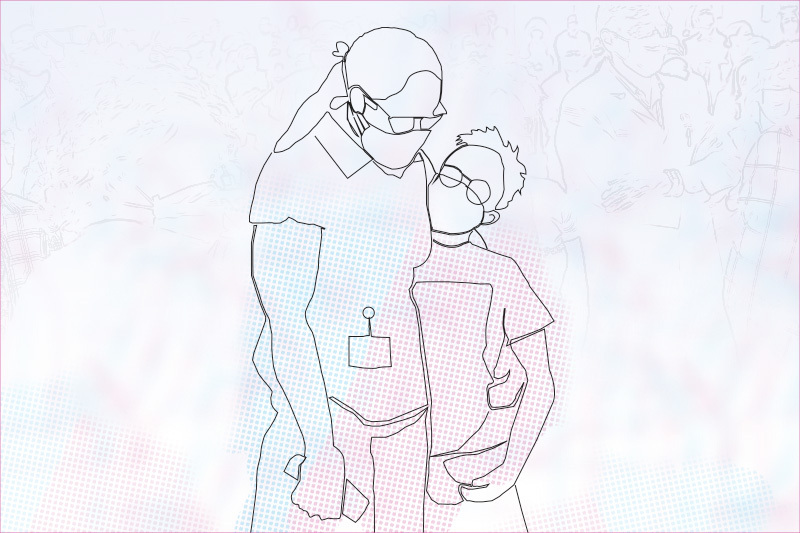Racism is a health issue: How it affects kids, what parents can do

Racism has once again gained national attention. Following the deaths of George Floyd, Ahmaud Arbery, and Breonna Taylor, people around the world are taking a stand against race-based inequality and violence. But even after it fades from the news cycle, racism will remain present in the lives of children.
How children experience racism
Racism can feel deeply personal for a child. Children may experience it in the form of racial slurs. They may encounter adults who treat them as racial stereotypes, not as individuals. They may see their parents slighted or treated with disrespect. “Children can internalize harmful stereotypes,” says Erica Lee, attending psychologist at Boston Children’s Hospital. “Over time experiencing or witnessing discrimination can negatively impact a child’s identity and self-esteem.”
But racism is also a pervasive social issue that plays a large role in the environment a child grows up in, the quality of their schools, the air they breathe, the water they drink. In a 2019 report, the American Academy of Pediatrics describes racism as “a socially transmitted disease passed down through generations.” Directly and indirectly, racist systems and policies contribute to health conditions that can impact a child for life.
How racism affects children’s health
Racism affects children’s health in numerous and complicated ways. Children who grow up in underserved neighborhoods are more likely to be exposed to air particles that increase their risk of asthma. They are at greater risk of brain and nerve damage from exposure to lead in their homes. Limited food choices and diets of highly processed foods increase a child’s risk of obesity, diabetes, and heart disease. Lack of access to health care has been cited as one of the reasons children of color are less likely to survive childhood cancer.
“Racism is a socially transmitted disease passed down through generations.”
– American Academy of Pediatrics
That’s on the physical side — racism also affects children’s mental health. Children targeted by racism have higher rates of depression, anxiety, and behavior problems. “Experiences of racial discrimination can make children feel less connected and less worthwhile,” explains Lee. “A child may react by withdrawing from activities they like or speaking up less in class.” Over time, learning suffers, and often, future opportunities as well.
And racism is stressful — for children targeted by racist acts as well as those who observe them. When asked to recall a racist event they’d witnessed as a child, young adults had stress responses comparable to first responders after major disasters. Over time, the hormones the body releases under stress can damage a child’s physical and emotional health.
What parents can do
It’s easy to feel overwhelmed by an issue like racism. But parents can protect their children from the negative health effects in a number of ways.
Acknowledge race
“Children see difference and inequality in the world around them,” says Lee. In an attempt to support ideals of equality and justice, some parents prefer to overlook racial difference. “Though it may be well-intended, avoiding the topic of race can give children the message that difference is bad and they shouldn’t talk about their experiences.”
She recommends that parents talk openly about race and inequality with their children and expose them to role models from a variety of backgrounds. You may socialize with diverse communities or bring your child to interracial events. You may read books, buy toys, or watch movies with characters from a variety of cultural groups. “Children need language to talk about these issues and space to process their reactions with caring adults,” says Lee.
Help your child build a strong cultural identity
“For children of color, hearing positive messages about their cultural history and values can provide a powerful buffer against experiences of racism,” says Lee. Kids who feel proud of their racial or ethnic identity are more likely to recognize bias for what it is, and less likely to believe that they deserve to be discriminated against.
Lee stresses the importance of instilling a sense of racial and cultural identity early. “When children reach adolescence, they are more susceptible to peer influence. It’s important that they have a strong sense of self and pride in who they are before they crave peer acceptance.”
“Having conversations and correcting misperceptions are not only important in parent-child relationships, they apply to provider-patient relationships as well.”
– Erica Lee
Teach your child to be a force for positive change
If left to fester, racism instills a sense of helplessness in both children and adults. But standing up to racism can make a difference in many ways. On a personal level, seeing they can be part of a solution teaches kids to feel empowered, not helpless. On a social level, individual and community actions can promote racial equality and justice.
You and your child might help sign people up to vote. Together, you might organize a food drive to help families facing hunger. Connect with groups in your community or reach out to national organizations such as Color of Change, Black Lives Matter, or Race Forward for ideas. “Parents can model ways to talk about racism and contribute to efforts to address it,” says Lee.
Speak up for your child’s health
In conversations with minority youth, Lee has heard stories of providers making assumptions about their families or backgrounds that feel insulting and alienating.
If you feel like your child’s health care provider is acting on racial bias, say something. If you are uncomfortable or think the conversation may not go well, consider contacting the organization’s patient relations department. Or look for a different provider. “Parents have every right to expect that the professionals who care for their child respect their cultural backgrounds and identities,” says Lee. “Having conversations and correcting misperceptions are not only important in parent-child relationships, they apply to provider-patient relationships as well.”
Racism may be harder to define than conditions with concrete symptoms. But its impact on children’s health is no less real. It may feel personal, it has been called political. But racism is a social issue that deserves to be challenged on every level: personally and systematically, locally and nationally, immediately and for many years to come.
Read more on racism from Boston Children’s.
Related Posts :
-

A true hero’s journey: How a team approach helped Wolfie overcome pancreatitis
Wolfgang, affectionately known as “Wolfie,” is a bright and energetic 7-year-old with a quick wit and a love for making ...
-

A toast to BRD4: How acidity changes the immune response
It started with wine. Or more precisely, a conversation about it. "My colleagues and I were talking about how some ...
-

Help your child manage anxiety about school violence
With news of school shootings and other violence often reaching children, parents sometimes grapple with how to help their child ...
-

New genetic insights could change how we treat, and talk about, polycystic ovary syndrome
Polycystic ovary syndrome (PCOS) has long been viewed as a hormonal disorder affecting women of reproductive age. However, ongoing research ...





